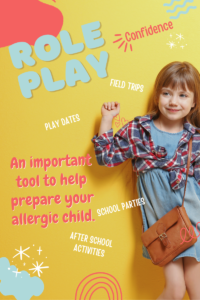
Role playing is one of the most important tools you can teach your allergic child or teen. Role playing happens when two or more people act out roles in a particular scenario. It’s a great tool for helping you or your child prepare for unfamiliar or demanding situations.
Did you know role playing is used in school and training programs?
Remember when you were little and your parents taught you what to do if a stranger approached you, or how to be polite when adults are talking? As a parent or guardian, one of the most important things you can do is to make sure your child will be safe by teaching them how to make decisions even though you may think they are too young. This quickly becomes important as they move on to their preschool and elementary years and they rely on their teachers and staff to help them.
Role playing has been practiced in our house since our children were little. For us it was important to let our children know there are several ways to approach any situation and it is up to them to decide what is the best scenario for them. We found that this made them more independent and confident at school and with their friends.

For example, when our daughter was in 1st grade, she came home one day and said she was upset because one of her classmates was being mean to her friend on the playground. Knowing that our daughter was shy and too young to approach this classmate directly, we gave her two choices and told her she should pick the one she felt more comfortable with. We suggest: 1. She could go tell the playground adults and have them take care of it, or 2. She could grab her friend to play with and ignore their classmate; she would leave them alone.
Our daughter chose to rescue her friend and take her away from the situation and eventually their classmate gave up and ignored them. We were not surprised at her choice because of her shyness but we also knew that giving her two choices to choose from allowed her to pick the one she liked best.
But how does this relate to food allergies? Let’s face it, most activities revolve around some kind of food and for little kids’ snacks are important. In preschool and kindergarten your kids bring snacks to eat, and parents provide snacks for sports games and playdates. These are just a few examples but for the allergic child, there will be many more situations where they will need to navigate their allergies on their own.

Here are some food related activities for grade school children:
Field trips
After school activities
Allergy-free table
Playdates
School parties
Birthday parties

As you can see these activities, whether during or after school, will more than likely involve food. And as a parent of an allergic child, these can be overwhelming and even very scary.
As we learned earlier, role playing can be a highly effective tool which can be used here as well. We would suggest you look at all the situations that could affect your allergic child and start role playing them when they are young and not wait until something bad happens.
Figure out which situations will allow for multiple good options and which ones only have one good option. A few examples include:
When there are multiple good choices:
A classmate has asked your child to play at their house and you send your allergic child with their own snack. However, when it is snack time the mom tells your child that she has made some cookies and offers them to your child. If you have not practiced role playing this situation, your child might say yes to be polite and eat something they are allergic to. But what could you have done if you practiced ahead of time?
They could say, “Thank you, but I am not hungry.” OR
They could say. “I have allergies and my parents want me to only eat what they have packed.”
Some kids are not assertive enough to say talk to an adult so they may feel better just not eating anything at all. Either one is a good choice and the multiple options allows them to chose which one works best for them.
When only 0ne choice is good choice:
Your child sits at the peanut-free table at school and one of her friends accidentally brings a peanut butter and jelly sandwich to school and she sits down at your table.
Does your child ignore the situation?
Does she tell her friend she needs to sit at one of the other tables?
This is an example of a situation where multiple options would not work for her. She really should not sit next to her friend! For young children, it can be hard to understand why their friend cannot sit with her, but it is important to explain to her in terms she knows that this could make her sick and then both her and her friend will be sad. Allow your child to ask as many questions as she may have for her to clearly understand that there is only one satisfactory answer in this situation.
Practice these techniques early and often so your allergic child becomes more comfortable with this technique. This way as they get older and more situations come up, they can either ask you for advice or they will feel confident enough to make the decision on their own. We want to keep them safe, but we also want them to be confident, independent thinking adults.
Here’s to our happy and healthy children!
We’ll talk about some allergy-related circumstances that will occur more often as your child enters their teens and college years.

Leave a Reply